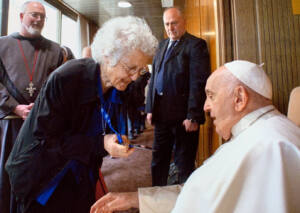
WelCom February 2024
Michael Fitzsimons
The synodal process offers religious orders a powerful tool to be less hierarchical and more transparent in the way they operate, says Sr Margaret Anne Mills, Congregational Leader of the Sisters of Compassion.
Last November, Sr Margaret Anne attended meetings for Superior Generals of religious congregations which focused on ‘Synodality: A Renewed Call to the Prophecy of Hope’. The meetings were held in Sacrofano, 40 minutes out of Rome, and were organised by the executive councils of the International Union of Superiors General (UISG women) and the Union of Superiors General (USG men).
The USIG delegates met for two days receiving reports of the UISG’s projects (www.uisg.org). This was followed by a combined gathering of over 250 Superiors General, evenly distributed between male and female religious leaders from around the world.
The focus of the gatherings was on the ability of religious communities to promote synodality as a way of life and on the call for religious to be prophetic bearers of hope in today’s world.
Sr Margaret Anne said that, through synodality and the greater involvement of lay people in decision making, the Church is being called to be more transparent and accountable in the way it operates.
‘Historically very hierarchical structures have led to the abuse of vulnerable people, including women religious who didn’t have a voice and had no idea where to go’, she said.
‘But that is changing. So accountability, transparency, good organisational structures that encourage greater participation, that’s a big thing for UISG, and USG.’
Sr Margaret Anne said that religious life would always be there in some form or another because it’s been going for so many years. But change is a constant.
Sr Margaret Anne was impressed with the synodal process of discernment, which ensured the voices of all participants were heard at the gatherings.
‘The process begins with silence to pray and focus. Then each member shares on an issue without discussion. The next round is not what do I think, but what did I hear? What’s the Spirit saying? The third round involves coming to a conclusion as a group. What I found really interesting myself was, I go to the table with an idea, and I come away with a new idea, having gone through a genuine collaborative process. And that is synodality in action. Everyone has an equal voice. That’s the process of contemplative listening.’
Sr Margaret Anne said that globally religious orders are at various stages of development, some in a growth phase, others like the Sisters of Compassion are coming to completion.
‘The Sisters of Compassion have time to ensure the Sisters are cared for and that structures are in place to enable the Compassion ministries to continue. There is also the reality that many of the works of religious can be done beautifully by other people. Or in some cases the social needs which religious orders were meeting in the past have changed. And so the laity-led church, described in Vatican II’s Gaudium et Spes, is finally coming through. It’s taken 60 years of searching and exploring to get there, but we’re getting there.
‘It’s a transformation that I think Pope John XXIII wanted – church as the people of God. There’s something emerging which is bigger than the brotherhood or the sisterhood and that is the greater participation of lay people. Lay people are picking up the charisms, such as our charism of compassion, and in many cases are the decision makers.
‘This transformation expands possibilities for religious and lay people to participate at all levels and have their voices heard. It may sound simple but in fact there’s still a long way to go, especially in countries where women are subservient and controlled by bishops.’
Pope Francis addressed the gathering and afterwards engaged with every delegate who wanted to shake his hand.
‘His witness was amazing, coming into the auditorium in a wheelchair,’ said Sr Margaret Anne. ‘The various groups had each prepared a question for him. Ours was: “what are your dreams after the synodal process”. And his response was “a better question would be what are your nightmares?” That sent everyone into an uproar!’
Pope Francis affirmed the importance of keeping talking to one another, listening intently and praying, said Sr Margaret Anne.
‘He himself was totally engaged when everyone he met. He is just an extraordinary person.’
The post Synodal process powerful tool for Religious Life first appeared on Archdiocese of Wellington.
Celebrating Migrants as Missionaries of Hope
Pastoral
Published on 16th Jun, 2025
June 22 is the Day of Prayer for Refugees and Migrants [..]
Monsignor Brian Walsh’s 50 Years of Priesthood
Pastoral
Published on 23rd May, 2025
Mons Brian celebrated his 50th anniversary on Sunday 18 May [..]
Palmerston North to host parish renewal event
Pastoral
Published on 22nd May, 2025
The Hope and Renewal Summit will be hosted by Palmerston North this October [..]
Meeting with Pope Leo XIV: A new hope for Eastern Churches
Pastoral
Published on 20th May, 2025
Pope Leo XIV received representatives from the Eastern Catholic Churches in an audience [..]
PEACE WITH CREATION
Pastoral
Published on 12th May, 2025
Celebrating the 10th Anniversary of Laudato Si’: Planting Seeds of Hope and Peace [..]
